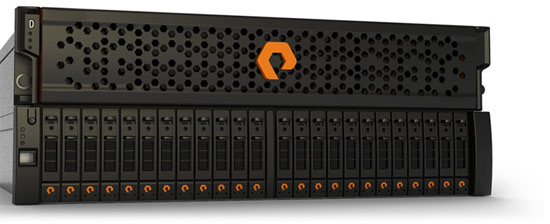Hot on the heals of flash storage all-stars Fusion-io and Violion Memory, comes Pure Storage, a startup that’s making some bold claims about its tech, particularly surrounding costs.
Pure Storage, which just emerged out of stealth, has attracted $55 million in funding, including $30 million in a just-announced series-C round of funding led by Redpoint Ventures and backed up by Samsung Venture Investment (VC arm of the world’s top flash chip supplier). The company makes two all-flash storage arrays with capacities of up to 11 TB and 22 TB that promise to bring the cost of flash-based storage in line with enterprise hard drive-based hardware, with huge space and energy savings (10x reductions in both) to boot.
I know, you’re thinking that’s quite the feat considering that solid-state drives have yet to achieve price parity with platter-based hard drives. And you’re right. But Pure is making a price/performance argument that CIOs may find themselves receptive to, particularly if their businesses are getting squeezed by the constraints of their current storage systems.
What if there’s an alternative that can eliminate mechanically-induced bottlenecks — solid-state chips shuttle data faster than spinning platters and read-write arms — to better keep up with ever-faster server processors? And what if there’s less data to store (via data deduplication, of course)? Does the picture become more attractive? Yes, according to Pure’s CEO, Scott Dietzen.
Arik Hesseldahl of All Things D, has the details.
But deduplication is expensive on hard drives, and really doesn’t make sense. Because the mechanical arm in a hard drive is always searching around for where its next needed block of data is to be found, if you employ deduplication, you end up with a bunch of reference signs telling the arm where to go, [CEO Scott] Dietzen says. The end result is that the disk has to spin more, not less. Flash memory chips don’t have that problem. “We make that process fast, because there’s no performance hit to the deduping process,” he says.
On top of that, Pure has created some algorithms that make the process a lot more granular than on hard-disk-based systems, by working with smaller disk-sector sizes. How small? He wouldn’t say exactly.
Combined with flash’s inherent performance edge, Pure’s FlashArray can bring costs down to $5 per gigabyte and less — in line with that of hard drives, according to the company. We’ll see…
Image Credit: Pure Storage


Leave a Reply